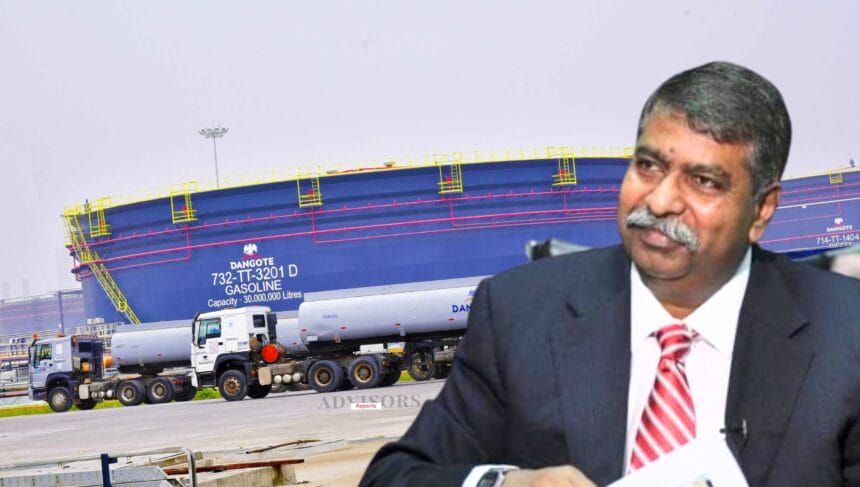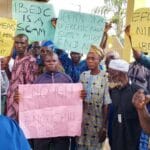… faults IOCs for inflating local crude prices by $6 above market rates
Oredola Adeola
Dangote Oil Refinery and Petrochemicals has raised concerns about its survival, accusing the Nigerian Midstream and Downstream Petroleum Regulatory Authority (NMDPRA) of granting licenses to marketers to import ultra-high sulfur diesel from Russia.
The company also criticized International Oil Companies (IOCs) operating in Nigeria for inflating local crude prices, demanding premiums of up to $6 above market rates, and forcing the refinery to import more expensive crude from countries like the United States.
Devakumar Edwin, Vice President, Oil and Gas at Dangote Industries Limited (DIL), made this known to a group of Energy Editors at a one-day training programme, organised by the Dangote Group, in Lagos on Friday.
According to Edwin, NMDPRA has been issuing licenses indiscriminately, allowing marketers to import low-quality, high-sulfur diesel into the Nigerian market.
He stated, “The Federal Government issued 25 licenses to build refineries, and we are the only ones that delivered on our promise. Therefore, we deserve every support from the Government. It’s worth noting that since the start of production, we have exported more than 3.5 billion liters, representing 90% of our production.”
“We are urging the Federal Government and regulators to provide us with the necessary support to create jobs and prosperity for the nation.”
He also mentioned, “While the Nigerian Upstream Petroleum Regulatory Commission (NUPRC) is doing their best to allocate crude for us, the IOCs are deliberately frustrating our efforts to buy local crude.”
“Regrettably, the country is also playing into their hands by continuing to issue import licenses, which harms our economy and the health of Nigerians exposed to carcinogenic products.”
“Despite us producing and bringing diesel into the market, compliant with ECOWAS regulations and standards, licenses are being issued in large quantities to traders who buy extremely high-sulfur diesel from Russia and dump it in Nigeria.”
“Since the US, EU, and UK imposed a Price Cap Scheme on Russian Petroleum Products from February 5, 2023, numerous vessels with Russian ultra-high sulfur diesel are waiting near Togo and being purchased and dumped into the Nigerian Market.”
“European countries were alarmed by the carcinogenic effect of the high sulfur diesel dumped into the Nigerian Market, leading countries like Belgium and the Netherlands to impose a ban on such fuel being exported to West Africa.”
“In May, Belgium and the Netherlands adopted new quality standards to halt the export of cheap, low-quality fuels to West Africa, harmonizing its standards with the EU, targeting diesel and petrol with high sulfur and chemical content.”
“Unfortunately, the Nigerian Midstream and Downstream Petroleum Regulatory Authority (NMDPRA) granting licenses for importing dirty diesel and aviation fuel has led the Dangote refinery to expand into foreign markets, exporting diesel and aviation fuel to Europe and elsewhere.”
“Despite industry players resisting our efforts to reduce diesel and aviation fuel prices, our goal is to grow our economy.”
“The refinery meets international standards and complies with strict guidelines and regulations to protect the local environment, enabling it to export products globally.”
“Urging the Federal Government and National Assembly to speedily implement the PIA and protect Nigeria’s interests, he noted Ghana’s recent ban on importing highly contaminated diesel and PMS.”
“It’s regrettable that import licenses are granted despite our capacity to produce nearly double the products needed in Nigeria and export the surplus.”
“Since January 2021, ECOWAS regulations prohibit importing highly contaminated diesel into the region.”
Edwin mentioned recent bans by Belgium and the Netherlands on high-sulfur diesel exports to West Africa. Belgium’s Minister of Environment, Zakia Khattabi, announced the ban following the Netherlands’ April 2023 prohibition of low-quality fuel exports via Amsterdam and Rotterdam ports.”
Khattabi emphasized that the Netherlands’ restrictions redirected the export of dirty fuels to Belgium, which is now used by oil producers and traders to ship gasoline with excessively high levels of benzene and sulfur.
“For far too long, toxic fuels have been departing from Belgium to destinations, including Africa, causing extremely poor air quality and even carcinogenic effects,” said Khattabi.
Edwin mentioned a 2017 investigation by Public Eye, revealing that polluted fuels were exported from Rotterdam and Amsterdam to African markets, with up to a quarter of the petrol and diesel in West Africa originating from these ports.
These fuels, according to him, reportedly contain sulfur and other pollutants in quantities up to 400 times the limits permitted in Europe.
Edwin emphasised that that report encouraged the Netherlands and Belgium to enforce regulations to protect millions of Africans from exposure to toxic fuels.
Condemning the actions of the International Oil Companies (IOCs), the Vice President of Oil and Gas at Dangote Industries Limited (DIL) recalled that the Nigerian Upstream Petroleum Regulatory Commission (NUPRC) recently met with crude oil producers and refinery owners in Nigeria to ensure full adherence to Domestic Crude Oil Supply Obligations (DCSO) as outlined under section 109(2) of the Petroleum Industry Act (PIA).
He stated that despite these regulatory interventions, it seems the IOCs’ objective is to ensure that our petroleum refinery fails.
He said, “They are either deliberately asking for ridiculous premiums or simply stating that crude is not available. At one point, we paid $6 over and above the market price.
“This has forced us to reduce our output and import crude from countries as far away as the US, increasing our production costs.
“It appears that the objective of the IOCs is to ensure that Nigeria remains a country that exports crude oil and imports refined petroleum products.
“They are keen on exporting raw materials to their home countries, creating employment and wealth for their economies, adding to their GDP, and then dumping expensive refined products into Nigeria, making us dependent on imports.
“It is the same strategy the multinationals have been adopting in every commodity, causing Nigeria and Sub-Saharan Africa to face unemployment and poverty, while they create wealth for themselves at our expense.




